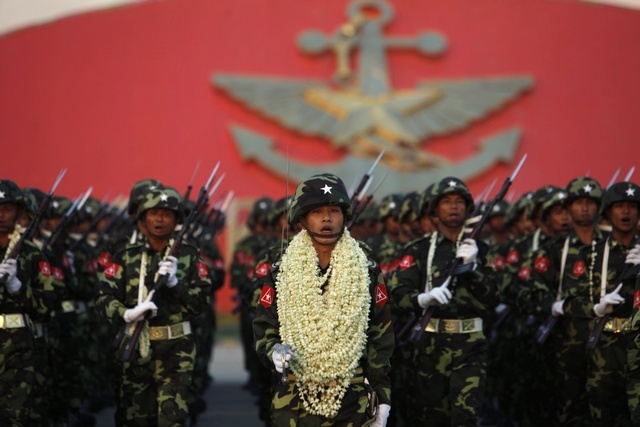The Burmese army has targeted, attacked and killed civilians with impunity in ongoing fighting in Kachin State and northern Shan State, Fortify Rights said in a briefing published on Thursday.
The rights group urged the Burmese government to act to end such attacks and hold perpetrators accountable.
“The Burmese government wants the world to believe its human rights record is beyond reproach, but that’s just not the reality,” said Matthew Smith, executive director of Fortify Rights. “The romantic narrative of sweeping political change is inconsistent with the situation of ongoing war crimes and widespread impunity.”
On Wednesday, The New York Times published the names of three top-tier Burmese military officers against whom sufficient evidence has been gathered in a report by Harvard researchers for war crimes against ethnic communities in Burma.
[related]
The Harvard report, which is due to be released on Friday, 7 November, has named Maj-Gen Ko Ko, who is currently Burma ’s home affairs minister, Lt-Gen Khin Zaw Oo, now commander of the Army Bureau of Special Operations, and Brig-Gen Maung Maung Aye, whose current position is unknown.
The findings of the report were presented to the Burmese Deputy Defence Minister Maj-Gen Kyaw Nyunt by one of the authors, Mathew Bugher.
Bugher communicated the response of the Burmese defence minister to the The New York Times and said that, “ He [Maj.Gen Kyaw Nyunt] essentially said, ‘you got it wrong and your sources are all one-sided.”
In a continuing investigation into the conduct of the war between the Burmese army and the Kachin Independence Army (KIA), Fortify Rights documented incidents in 2011, 2012, and 2013 in which Burmese government troops attacked civilians and non-military targets in contested territories. Between September 2013 and August 2014, Fortify Rights conducted nearly 100 interviews in the conflict zones of northern Burma.
Most of the attacks documented by Fortify Rights reportedly occurred in civilian-populated areas with no presence of KIA or other non-state armed groups. These attacks led to widespread displacement of civilians and appear to be designed to undermine the KIA’s civilian-support structures and to gain effective control of strategic locations, including trade routes and areas rich in natural resources, the report said.
The Burmese army shelled and razed civilian homes, attacked makeshift camps of displaced persons, and entered villages while opening fire on civilians with small arms, Fortify Rights said. In some cases, soldiers committed extrajudicial killings.
“They shot at the villagers,” said Khon Li Aung (not her real name), an ethnic Kachin woman, referring to Burmese soldiers who entered and attacked her village, Mung Ding Pa, on 22 October 2013. “Some [civilians] were running to the church and some were coming from the fields to get to the church.”
Humanitarian law requires parties to armed conflict to distinguish between military and non-military targets, including civilians, and to refrain from attacking civilians. Moreover, attacking civilians is a war crime under international criminal law.
“The government’s denial of wartime abuses and the international community’s soft-stepping has gone on for too long,” pointed out Smith.
Kachin State is home to multi-billion dollar jade deposits, minerals, timber, lucrative trade routes to China, and significant hydropower potential, all forming the backdrop to the conflict. These factors are compounded by ethnic and political disputes dating back decades. The conflict in Kachin State resumed in June 2011 in the area of a Chinese-investor-led hydropower dam near Sang Gang village, Kachin State, ending a 17-year-long ceasefire agreement.
Since 2011, the government and 14 non-state ethnic armies have signed preliminary ceasefire agreements. The KIA is not among those calling a truce with the government.
“If the government genuinely wants peace in ethnic states, it must end and rectify attacks on civilians and other abuses,” said Matthew Smith. “The survivors of these attacks have been denied their right to access justice and compensation for their losses—that needs to change.”



